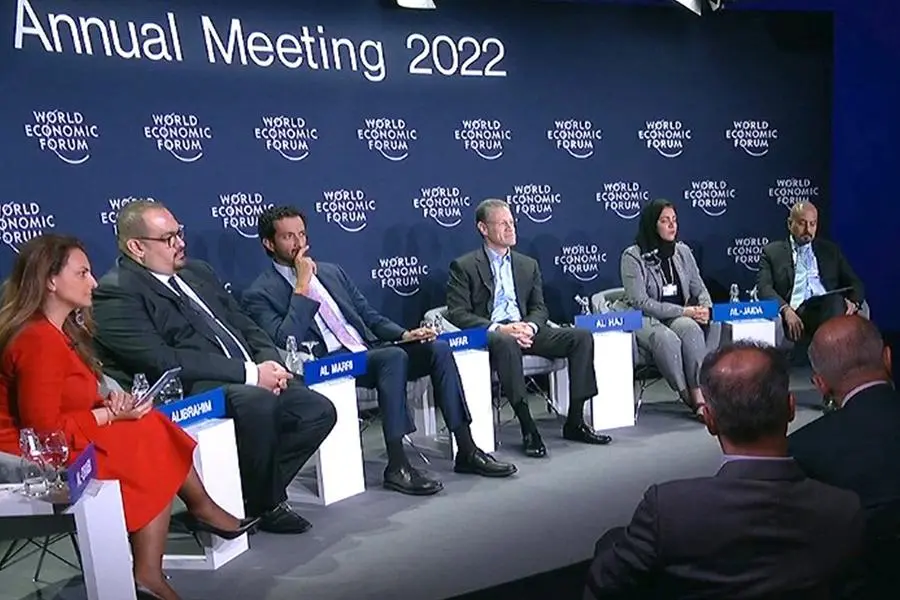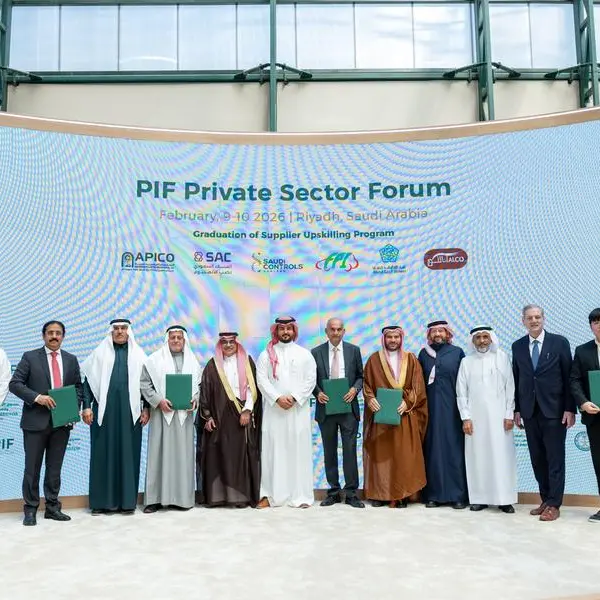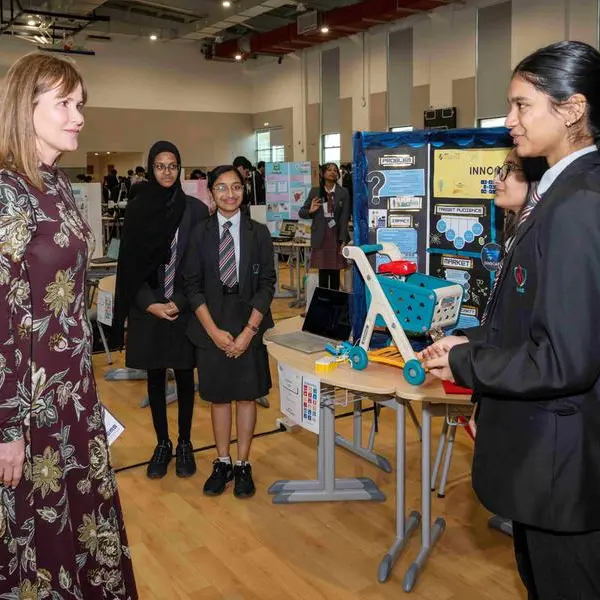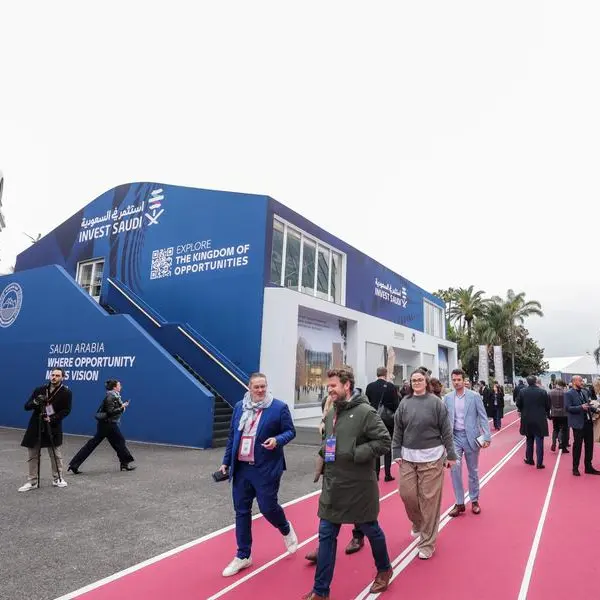PHOTO
- 85% of 300 high-net-worth investors in the Middle East intend to increase their exposure to ESG and sustainable investments in the next 5 years.
Sharjah, United Arab Emirates: The World Economic Forum (WEF) hosted an expert dialogue on the collaborative action Middle East leaders must take to navigate between net-zero ambitions and socioeconomic realities. The session, titled “Transitioning to a Green Middle East,” took place during the WEF Annual Meeting 2022 in Davos, Switzerland. The dialogue came at a critical time, with the next two United Nations Climate Change Conferences, COP27 and COP28, both set to be hosted in the region, by Egypt and the United Arab Emirates, respectively.
Moderated by The National Editor-In-Chief, Mina Oraibi, the session convened leaders in government and business to share their insights on the path to a more resilient and sustainable future. Participants included Minister of Economy of the United Arab Emirates, Abdulla Bin Touq Al Marri, Minister of Economy and Planning of Saudi Arabia, Faisal Alibrahim, Chief Executive Officer of Crescent Enterprises, Badr Jafar, Chief Executive Officer of Qatar Financial Centre, Yousuf Mohamed Al-Jaida, and Associate Professor of Molecular Biology at Sultan Qaboos University, Lamya Al Haj.
The Middle East and North Africa (MENA) is one of the most climate-vulnerable regions, with the destructive impact of climate change becoming increasingly evident in the shape of droughts, water scarcity, and elevated pollution levels.
Despite this, the region is regarded as well-positioned to become a leader in renewable energy and in green and blue hydrogen. And while oil and gas will continue to play a significant role in the regional energy landscape, the region has witnessed the promising emergence of a new, more circular economy. Regional leaders are at a crucial crossroads as they foster more sustainable economies, while addressing the implications of the energy transition.
“For years, I’ve been advocating sensible energy policy that supports a greener evolution of energy systems whilst ensuring we do not put energy security at risk or impede the economic and social progress of developing regions around the world,” Badr Jafar, Chief Executive Officer of Crescent Enterprises, remarked. “A green, resilient, inclusive approach to development can usher in a new model of growth for MENA, creating jobs while delivering the benefits of climate resilience, decarbonization, cleaner air and water, healthier oceans, and sustainable food and agricultural systems.” he added.
Crescent Enterprises, a UAE-based global conglomerate, continues to invest in the energy evolution through its own operations, portfolio companies, and corporate citizenship initiatives. In the past 3 years, the company has invested over $300MM across the world in sustainable investments, over 70% of which has gone into global growth markets. It has also been particularly active in the transition to sustainable transport in the region through its shipping and logistics subsidiaries, Gulftainer and Momentum Logistics, and by co-launching a UAE-based sustainable transport company, ION, aimed at creating a zero-emissions transport infrastructure in the region.
Session participants underscored a shared sentiment that mobilizing climate action in the region will require a localised, multi-stakeholder approach. Optimistically, government, business, and civil society-led initiatives are on the rise in the region, with a notable growth in the capital, time, and talent invested in the infrastructure needed to progress. The UAE has invested $40bn in clean energy over the past fifteen years, with plans to invest an additional $160bn in renewable energy over the next three decades on the road to net zero.
“Energy security is a high priority. And it’s something we need to really understand. The fragmentation that’s happening globally, and energy supplies, will really affect the aspects of energy going forward. With that, the UAE has a long-term plan.” remarked Minister of Economy of the United Arab Emirates, Abdulla Bin Touq Al Marri. “The creation of the company Masdar, the implementation of solar panels, global projects helping the world to diverse their energy supply, all show the UAE’s investment in future energy security […] The investment in diversifying energy aspects is important and vital for any future development of the region.”
Badr Jafar cited the UAE’s landmark Net Zero Pledge and related strategy of going net-zero by 2050 as a great example of the practical and conducive policy, adding “This is all achievable with smart energy policy, as opposed to politicised rhetoric. The UAE’s Net Zero Pledge and related strategy of going net-zero by 2050 is a great example of a practical and conducive policy that relies on a mix of renewables, natural gas, hydrogen, and nuclear in order to ensure affordable, accessible and acceptable energy is available to meet the growing demands of industry and our population”
Nearly 2,500 leaders across government, business, civil society, academia, and media from across the globe have participated in the World Economic Forum's Annual Meeting 2022 this week. With all discussions centred around the theme, “History at a Turning Point: Government Policies and Business Strategies.” A recording of the “Transitioning to a Green Middle East” session can be viewed here.
-Ends-
About Crescent Enterprises
Crescent Enterprises is a multinational company headquartered in the United Arab Emirates. It operates under four platforms: CE-Operates, CE-Invests, CE-Ventures, and CE-Creates, which span diverse sectors including ports and logistics, power and engineering, food & beverage, business aviation, and across verticals such as private equity, venture capital, and business incubation.
*Source: AETOSWire
Contacts
Mohammed Al Barazenjey
mb@saharapr.com




















